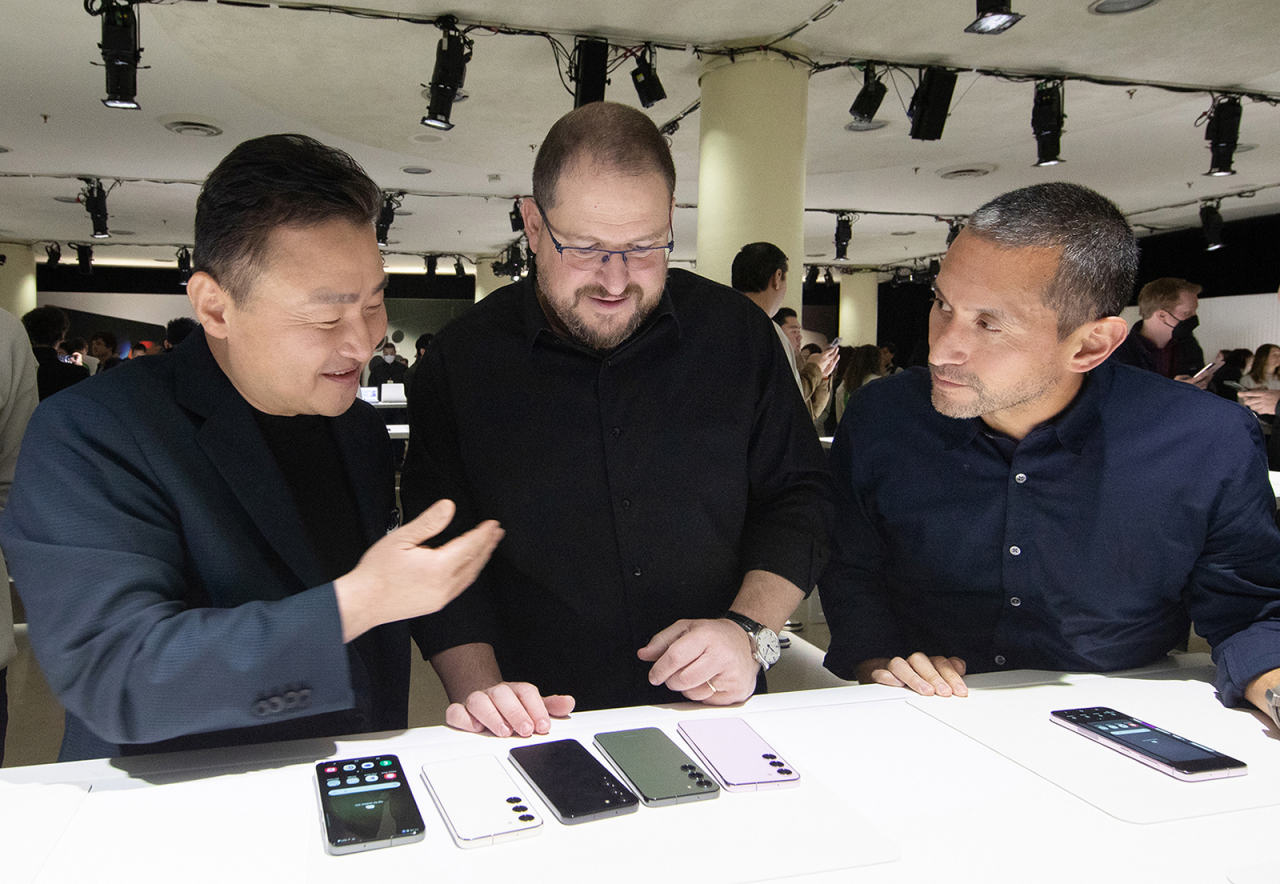 |
From left: Samsung Electronics President Roh Tae-moon, Qualcomm CEO Cristiano Amon and Hiroshi Lockheimer, senior vice president of platforms and ecosystems at Google, chat at the unveiling event for Samsung's latest Galaxy S23 phones in San Francisco on Wednesday. (Samsung Electronics) |
Samsung Electronics, the world’s largest smartphone maker by shipments, is bolstering ties with global tech giants Qualcomm and Google to build the next-generation extended reality ecosystem, as its archrival Apple, which tops in revenue, is expected to launch a mixed reality headset this year.
At the annual unpacking event showcasing the new Galaxy S23 smartphone series, Roh Tae-moon, Samsung Electronics' president and head of mobile experience, appeared together with Qualcomm President Cristiano Amon and Google’s Senior Vice President Hiroshi Lockheimer to announce their trilateral partnership to establish an ecosystem for the next-generation XR technology. Extended reality refers to a combination of virtual reality and augmented reality.
“Today, we are transforming the future of mobile, once again, by building the next XR experience together,” Roh said in the unpacking event held at the Masonic Auditorium in San Francisco, Wednesday.
From an “open, proven, trusted collaboration” with the iconic companies, Roh said they will bring the best of their technologies together to transform the future of human connection.
Amon said their collaboration would result to create next-generation experiences for Galaxy that would “blur the lines between physical and digital worlds.”
“With our Snapdragon XR technology, along with Samsung’s amazing products and Google experiences, we have the foundation to make these opportunities a reality and drive the future of the spatial internet,” Amon said.
Explaining Google’s past efforts investing in AR and VR, Lockheimer expressed excitement over the partnership.
“Delivering this next generation of experiences requires cutting-edge, advanced hardware and software. That’s why our collaboration with Samsung and Qualcomm is so exciting,” Lockheimer said.
“We’re working towards a new generation of computing, enabled by immersive experiences across brand new form factors, that will further elevate what you can do with Google.”
While the tech leaders did not provide details on the kind of product they would present, Samsung expected to take charge of the hardware and the form factor of their product in planning. Qualcomm and Google would be responsible for chipsets and the operating system, respectively.
Qualcomm recently introduced its first AR platform, Snapdragon AR2. Google has ARCore, an AR developer platform that is being used in over 1 billion Android devices, and Google Lens, which is being used for more than 8 billion visual searches per month, according to the Google official.
Wednesday’s announcement from Samsung signaling its reentry into the XR market comes at a time when its archrival Apple is expected to roll out its first mixed reality headset this year.
Samsung has previously released virtual reality headsets in the market, introducing its first Gear VR developed in collaboration with Oculus in 2015. Since the HMD Odyssey Plus in 2018, however, Samsung has not introduced a new VR device.
Samsung’s Vice Chairman Han Jong-hee had also hinted at the Mobile World Congress in 2022 that the company was developing a metaverse gadget to enable users to explore virtual spaces.
Apple is reportedly preparing to release its first MR headset before the World Wide Developer Conference slated in June. According to Bloomberg, the company’s envisioned MR headset would likely be named Reality Pro and cost around $3,000.
Apple is reported to have a technology development group dedicated to the development of AR and VR technology, as well as a team for standalone AR glasses to come later in the future.
By Jo He-rim (herim@heraldcorp.com)







![[Today’s K-pop] Blackpink’s Jennie, Lisa invited to Coachella as solo acts](http://res.heraldm.com/phpwas/restmb_idxmake.php?idx=644&simg=/content/image/2024/11/21/20241121050099_0.jpg)